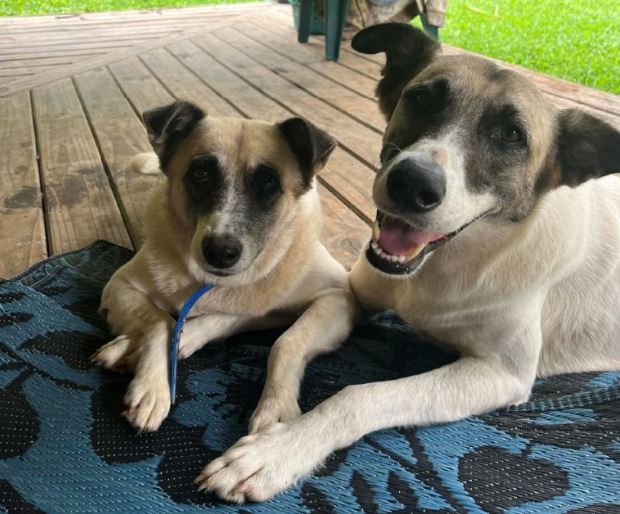Two dogs dead in possible poisoning attack
Wednesday 24 April 2024 | Written by Losirene Lacanivalu | Published in Local, National

Tiare with the collar and Cobra are victims of an alleged dog poisoning. SUPPLIED / 24042318
A pet owner feels viciously targeted after their pets were found dead yesterday morning, believing the attack was premeditated.
Cook Islands Police say they are working with the Ministry of Agriculture to find out if the two dogs, Tiare and Cobra, have died of suspected poisoning.
Police spokesperson Trevor Pitt said a complaint was filed at 7.34am yesterday reporting the suspected poisoning deaths of two dogs.
Pitt said police took samples and are consulting with Agriculture on the presence of any chemicals.
Dog Rangers responded to the case and noted the presence of two takeaway plates near the dogs.
Pitt confirmed that the neighbours were also spoken to and investigation was pending.
Claudine Chloe took to social media yesterday, warning pet owners around the Vaimaanga backroad near Coconut Haven, after two of her daughters’ dogs were found dead, frothing from their mouths.
She believes the dogs were poisoned as they were known to never wander onto the backroad from home.
Chloe said this was the first time this has happened in the area.
She claimed to know who the culprits were and that they had entered her private property, leaving two plates of poisoned food behind. Footprints were also spotted in the area.
She said police were notified. They were also looking for their cat and two chickens, which were found near the plates of food, were in a critical condition.
“This was a personal attack, premeditated,” Chloe said.
She alleged that they had previously received a complaint about their dogs barking, and that the police had visited them regarding this issue.
“A female mother dog and her son were the dogs they poisoned. Both harmless family pets never bitten anyone and protected our property at their best.”
Chloe added that the mother dog was a Christmas present to her daughter when she was about three years old and has been in the family for over 10 years.
“A normal person with a straight mind would never do such a thing! It’s in the hands of the police now, it’s inhumane and there should be harsh penalties for such an act.”
Dr Rose Hasegawa, medical director of vet clinic Te Are Manu, said that they do see animals that unfortunately get into toxic substances.
However, it is difficult to stipulate if these are intentional poisonings or accidental ingestions as there is often no witness at the time of exposure.
Dr Hasegawa says the clinic lacks the capacity to determine the exact toxic compound. This requires complex laboratory testing which is not available to them in the Cook Islands, and is usually not possible in vet clinics in both Australia and New Zealand as the testing is often very expensive.
“We often treat these animals on the suspicion of exposure according to their clinical signs.”
She added that they often see a large number of ciguatera fish toxicity, possible paraquat toxicity and rat poison toxicity.
“It is important that any pet owners who use chemicals and pesticides around their property to ensure that they are placed in areas where animals cannot get to, but that being said dogs and cats are very good at scavenging so we ideally recommend avoiding using them entirely if possible.”









































